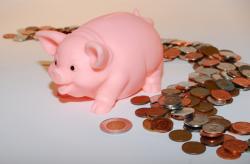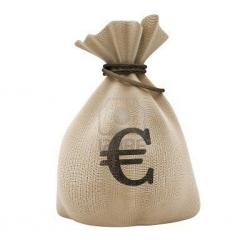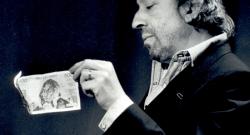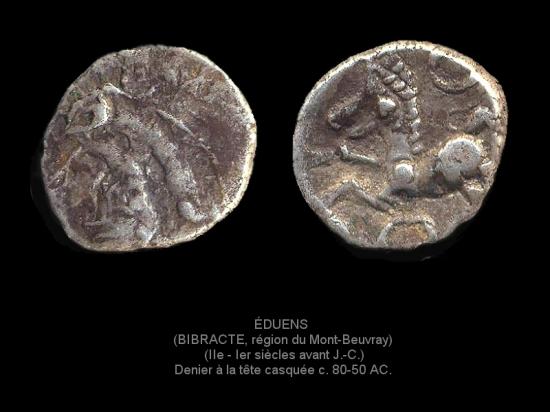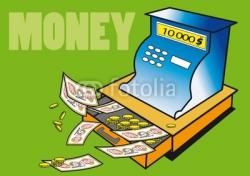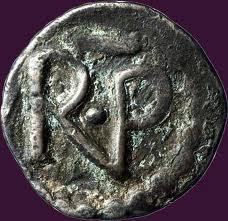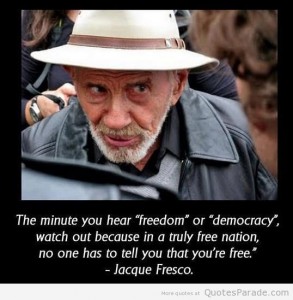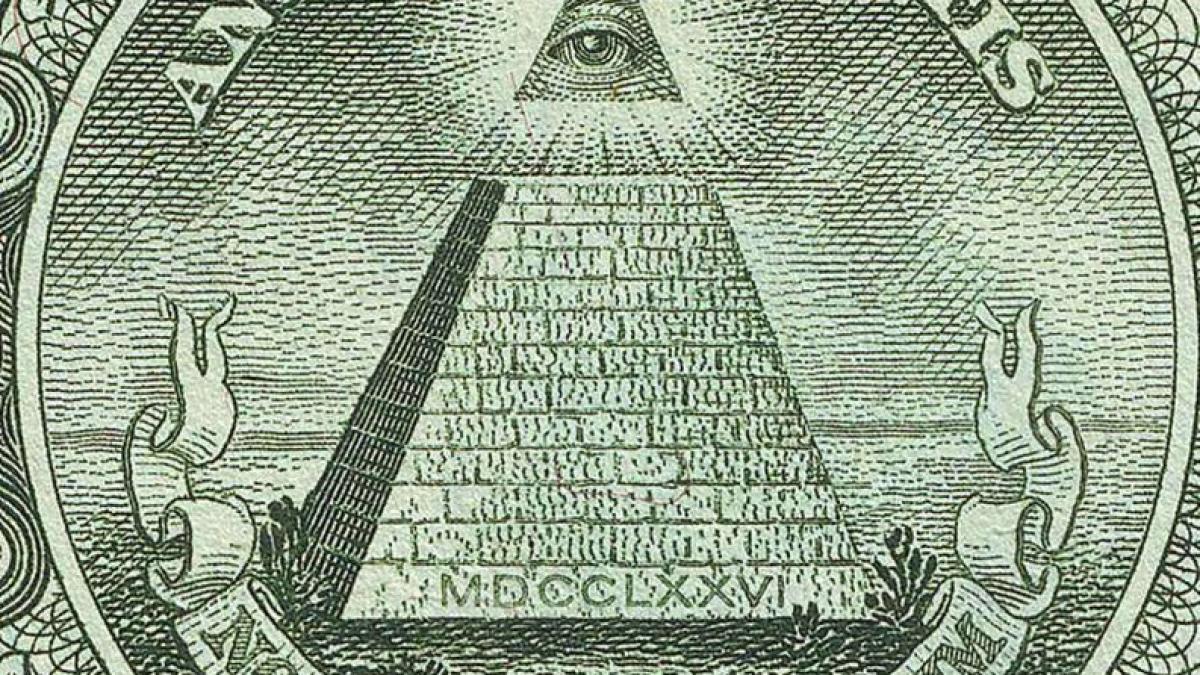Foray into an area reserved too: money - Part 6
Part IV Part Two
Part 1, Part 2, Part 3, Part 4, Part 5
"Come and help me! Whoever made it clear to his fellow man the meaning of these words is the unknown founder of all human societies."
Jacques Duboin (Liberation)
IVb
Currency and Society
The consequences of a currency debt.
Whatever the considered aspect, and unlike the liberal contention that money is neutral, the reality is that the fact of using the currencies of debt not secured on a manifest wealth created by private companies whose only profit objective is a huge impact, even if they are not generally perceived:
At the national level: a common commitment.
We saw above that the law (35) that requires all citizens of a nation (or group of countries, such as "Euroland" (36), accept payment in the currency, the -Ci became the recognition of a collective debt: it engages all citizens of this nation to provide the equivalent of the amount referred to anyone present that currency and that, therefore, a right to draw on goods and services sold by that nation.
So money is a national link (or community) between the citizens of the country (or group of countries) which issues they are united, says Benjamin J. Cohen (37), by the common commitment that is their currency as they are united, for example, by the use of a common national language.
So the question arises: who can make such a commitment on behalf of a State? It seems clear that in a democracy it can not be that the elected representatives of the people, and it is this fact that makes most people believe, in good faith, make it the experience by asking your neighbors, that it is the public authorities have a monopoly on money creation and control.
We have seen that government control over their national currency introduced at the beginning of the XIX century and it had its heyday in the middle of the XXth. But that in the 1980s, in the wake of the famous "liberal turn" described above, it was abandoned.
And the consequences are serious, if not well received: by giving this power, which nevertheless seems legitimate, governments are not only deprived of the possibilitépour state to use money creation to cope in an emergency to public expenditure necessary and unforeseen. They also gave up a key management tool of the economy through taxation (including the redistribution depends) and through interest rates or exchange rates: by creating more money, the state could decide to accept inflation, reducing the burden of debt, favored debtors over creditors, or, conversely, deciding to limit the money supply, the government reassured creditors. The devaluation of a currency was offered to the country's exporters immediate competitive advantage.
Finally, the public monopoly on money naturally strengthens the authority of politics: it is obvious that the more a government is able to ensure its monopoly unless its policy is subject to foreign influences. But since the free movement of capital has deleted these monopolies national currencies, they can be used outside of their territory (including tax havens), and they thus provide transactions and investments. Winners are private actors who can escape the constraints of any monetary policy, and the losers are the government, so those who elected them.
As most currencies were convertible into gold, universal reference standard, exchange rates between currencies were the result of a simple calculation, purely mathematical, the relationships between their weight in gold. The transactions are settled in any currency and only debit balances between countries were settled by reference to gold.
Since the abandonment of this reference, international trade can be established in any currency; the exporting country can set its price in its own currency, the importing country may require to pay with its own currency, or if the buyer and seller decide to, they can use the currency of a country not involved in their transaction .
In short: there is no international currency, there is more than defining a universal reference exchange rates between currencies, which are the currencies of debt securities whose value fluctuates with the market.
Now we have seen that to use in a commercial transaction, a currency debt introduces a delay and a risk to the seller: it is found, after giving his goods, with a lending it then going to have to be accepted as payment for other goods. It is therefore very important for him to be paid in a currency that he thinks she has and she will keep, or better she will gain purchasing power. A currency is said to be strong because its purchasing power is rising: it is the trend that is important, rather than the actual value. So it happens to the value of money what happens to the stock market value of the shares: a large international investor can influence the share price:
when placed on a currency or security by buying in bulk, the value of that currency or the stock goes up and then everyone wants it, and its rating continues to rise. And so suddenly, conversely, an investor decides to get rid of any security or currency, his fellow
as with the herd, think he has reason to believe that this title will lose value when they sell too, and indeed the title down. As currencies, such as shares, can be amplified by speculation. Thus, since it obeys the liberal ideology, the global economy, and with it the world's currencies, is not controlled in the public interest, but to thank you vogue runaways or winds panic which it is impossible to predict the magnitude and scope.
Hegemony for the country whose currency is used
International trade has become accustomed to using the dollar for foreign trade during the period 1933-1971 during which the currency has remained the only one theoretically indexed to gold. This usage was reinforced after the Second World War because the economy of the United States was the first in the world, its booming industry was at the forefront of virtually every area, its businesses, which they had not been bombed, enjoyed huge reconstruction contracts worldwide.
The imbalance in the balance of payments of the United States with the failure of their war against Vietnam threatened the dollar's role when it became clear that American banks did not have enough on deposit to honor such debts. But at that time, no other currency was managed to inspire more confidence than the dollar.
Since then, the European Union is built economically, the Airbus is an example: its planes compete with those of the American Boeing. Yet Airbus, EADS became still sets prices in dollars, the height is that it gets paid in dollars even when it sells its products in Europe. It is true that the widespread use of the euro in Euroland is still new ...
Such hegemony translates into a tremendous advantage when it comes to bank money (for which, as we have seen, there is no hard limit to its creation ex nihilo) and that all countries asking for their trade, the country that can produce at will emit.
The North Americans in turn benefits and signing shamelessly these IOUs that nobody them back asking for the honor they have lived for decades at the expense of other populations worldwide buying on credit. Professor of Political Economy at the University of California, Benjamin J. Cohen is well placed to explain: "A country whose currency has international status finance its deficits by issuing its own currency:" A country whose currency enjoys international status finance its deficits by issuing its own money "(38), taking the 1999 figures, he said that this was equivalent to an interest-free loan of 25 to 30 billion per year made in the United States by the rest of the world.
This assessment should be revised upwards since, not only because of the slowdown in the American economy, but also because the federal budget was in surplus in 1999, was set deficit policy GW Bush (lower taxes 637 billion in 10 years and huge increases in military spending, which reached $ 400 billion). It is planned to more than $ 300 billion for 2003 and over 400 in 2004 before taking into account supplements for war against Iraq. Thus the trade deficit accumulated by the United States is that they have to the rest of the world the equivalent of about a quarter of gross domestic product (GDP). Such debt is unthinkable from any other country, which would be well before we get to such excesses culminating in the collapse of its currency ... and IMF intervention.
Recent example:
all accounts denominated in Argentine pesos have been abruptly cut by over a third of their purchasing power in dollars.
This can not happen to the American dollar accounts when the reference is the American dollar! So the United States, no savings, neither the State nor in households and businesses and there it became normal to live on credit. The rise in debt levels has been overwhelming, tripling between 1964 and 2002, reaching nearly one third of global GDP (39).
Household debt rose from 200 to 7,200 billion and that of enterprises, with their frenzy of mergers and acquisitions financed by loans, increased from 53 to 7620 billion (nearly 7 times GDP). An American economist has calculated (40) between 1995 and 2002, the deficit of the trade balance had allowed the United States to confiscate 96% of global growth.
The operating risk
The risk, as we have seen, the nature of the currency of debt has led to a transformation of the economy if its offset.
First, the risk has developed a lucrative trade, the insurance. We can judge the weight taken in the company by insurance companies in finding their pressure to be entrusted with the management of pensions (41). Some recent scandals in the United Kingdom and the United States have shown the dangers of private management.
Risk is also the source of new financial instruments, based on speculation in futures markets, options, margin calls, hedge funds, etc., which are called derivatives because they are variations on paris courses, or indices or interest rates. These new "products" have proliferated because in all cases, whether prices rise or they lower their manipulation can yield very large ... All these creations lead either to expand the range of what speculators can buy and sell, or to use the multiplier effect of credit to allow speculators to pay credit (but without using their own money) that they hope to sell more expensive, conceding the difference.
This expansion greatly increases the dangers of the credit system:
weakening of the currency, increasing the number of wheels that can fail, and if the system collapses, extending the scope of the disaster. The greater this "leverage" over the blast growing in scale.
And all this is done at very high speed and the initiated. For the latter, it's a bargain, but the fact that derivatives are used to move a lot of money across the planet "without any radar signals do" (42) puts unpredictable to those who produce the real wealth risk. Hence the multiple crises, crash, etc. ruining brutally States. For example, while a report by the World Bank stated in 1997 that market liberalization would result in an overall economic boom including Asia, disaster struck economies and Asian currencies, which began as early as next: falling stock indices: 80% in Indonesia, 74% in Malaysia, 42% in Thailand, 29% in south Korea, and 73% collapse of the Indonesian rupiah, won 33% of the south Korean, and 12% of the Thai baht, followed by that of the Malaysian ringgit, which preceded little one Singapore dollar, after which it was the stock market crash in Hong Kong. The yen was deemed healthy because Japan had the largest reserve currency of the world, but the yen collapsed too. Such crises are not confined to countries in East Asia: Russia had hers in 1998, then it was the turn of Brazil, Argentina and the havoc since December 2001.
The powers of the currency
The national currency is a link between citizens by balancing two opposites that are necessary for a society to exist and function: the assertion of authority, which issues the currency, and the affirmation of personal liberty, that how to spend the money we have.
The authority that issues the currency therefore has the authority to require members of society on the one hand they believe in the value of the currency since it is no longer collateralized real, and the other hand they recognize the right to buy their goods or products to all who have this money, as it has forced currency.
Beyond the power of authority, there is a real fetish related to money and which originated perhaps the fascination with gold coins used for millennia.
Finally the money is a vector of domination that shows inequality. And it becomes a means of grabbing so violent when he was loaned against interest.
Pay: help or make an investment?
Throughout history, most religions have preached against lending at interest, considered in its moral aspect: giving to the poor is a virtue, but pay a fine, it's not quite give it, is to accept deny it momentarily, so provide a service. Or the company that calls itself "modern" hijacked the word service from its original meaning and tends to make paying any service, even the most mundane. All services that were naturally become free pay, to the point that it becomes abnormal, however, is that a loan is free.
However, it should distinguish between:
- A loan for a certain period of time, which is a service against payment
- An investment of money we do not have immediate use, it is no longer there to be of service to someone whose need is known, but to "grow" their savings
- An appropriation by a bank through the "multiplier effect."
In the second case, the money is placed, usually through a bank, which then agrees to pay a certain percentage of the sums entrusted to a specific term for this purpose.
In the third case, for against the bank cash to have it manages customer accounts and does not pay. These deposits used to open credit, by writing and leverage games, and it was she who earns interest on these credits ex nihilo. Or they impinge seriously on the purchasing power of the borrower must pay a lot more than he was paid. For example, if borrowed at 15%, it shall, within 5 years, pay double the amount that was credited.
Effect snow-ball Loan Interest:
The small investor who puts his money on a book to buy later his car will spend their savings plus interest at the time of purchase.
It is not the same for the big saver, because his savings earns him enough to live on his income and even place ever. Take an encrypted to see the importance of this snow-ball effect that is the very nature of capitalism example. Imagine that someone has a million and up to 10%. After a year, he received 100,000 euros in interest allowing him to live and to raise capital. Suppose he spends 40,000 euros for a living, he may place a year after 60,000 euros in addition to its first capital and is 1.060.000 euros that will bring him the second year.
If still providing capital to 10% and saw its interests, here are the numbers:
capital at 1 January - annual expenditure - capital position at year-end
1,000,000 40,000 1,060,000 first year
second 1,166,000 1,123,600 42,400
third 1,235,960 1,191,016 44,944
Fourth 1310117 47640 1262477
Fifth 1,388,725 1,338,227 50,498
Sixth 1,418,222 53,528 1,472,050
seventh 1,560,374 56,740 1,503,634
eighth 1,653,997 60,144 1,593,852
ninth 1,753,237 63,753 1,689,484
tenth 1,858,432 67,578 1,790,854
eleventh 1,969,939 71,632 11,898,307
twelfth 2088138
We see that the capital will have doubled in a dozen years, while allowing him to live his lifestyle increasing by 6% per year.
Debt in the world
This mechanism is of interest to understand the problem of Third World debt: countries that called developing and who borrowed the rich countries should in turn provide much more than they have received from them. Some are even forced to borrow again to pay the interest due on previous loans they have already repaid the capital: it is a downward spiral, orchestrated by the IMF, we discussed the role.
Here are some telling figures on the external debt of the Third World:
In 1979, the sharp rise in interest rates (from 5 to 20%) requires the southern countries to borrow at usurious rates of interest to pay their previous debts. In about thirty years, the debt increased from 50 to 2500 billion dollars, a 50-fold increase.
Alone in Latin America between 1980 and 2000, has spent an additional $ 106 billion on what it was. In general, during these 20 years, the countries of the South have transferred to the North 3.450 billion, which is six times the debt (567 billion) that they had in 1981.
In 1998, the 41 most indebted countries in the Third World have contributed to the rich countries of the North 1,680 billion dollars more than what they received.
In 1999, developing countries had to pay $ 350 billion for debt service (repayment and interest), especially the Brazilian government had to pay 95 billion reais of interest while its health budget public was only 19.5 billion.
The debt of Third World countries (excluding Eastern European countries) is now 2.000 billion (43). SSA reimburses each year four times more than it spends on health and education.
What is to give the poor if financial rules bind him to his poverty?
Interest rates and inflation
Inflation, by cons, reduces the debt. Take the example of a loan of ten million to 10%.
Contracted today, then it will pay off in a little over seven years, 20 million. But if by then the currency was devalued by 5%, $ 20 million will pay, in seven years, a purchasing power equivalent to a little less than 14 million today.
Whoever does credit is favored by higher interest rates.
Whoever is obliged to borrow is favored when the inflation rate increases.
During the post-war boom, the inflation rate was very high, it exceeded 15%, which contributed to large investments and allowed all those who then enjoyed a large income to build wealth. Then the slogan was "curb" inflation, which has kept the value of these assets. The policy imposed by the Maastricht Treaty to the European Central Bank, giving it sole directive to prevent price inflation exceeds 2%, goes in this direction: it protects the owners of capital at the expense of those who are required to take. When interest rates on loans are higher than the rate of price inflation, the interests of "bancassurance" are provided and the number of indebted households increases.
(35) "being forced" and "legal tender" of the national currency.
(36) All European countries have adopted the euro.
(37) Benjamin J. Cohen is Professor of Political Economy at the University of California
(38) in the special issue on the currency, No. 45 of the magazine Alternatives Economiques (Q3 2000).
(39) See, for example, figures recalled by Frederic Clairmont in Le Monde Diplomatique in April 2003.
(40) See World 20/11/2003.
(41) We have included studying the pension problem. Read about the # 989, entitled "Pensions, brainwashing for pension funds" and the numbers 1008, 1017, 1022, 1026, 1028, 1032 monthly Big Relay, BP 108, 78115 Le Vésinet cedex.
(42) R. Hahnel, "Panic at the controls.
(43) People's Tribunal, Porto Alegre, Attac info 312, March 8, 2002.
Sources: http://www.france.attac.org/
Continued from Part V: parallel currencies
Yves Herbo - 12-10-2014



